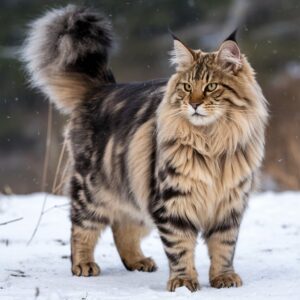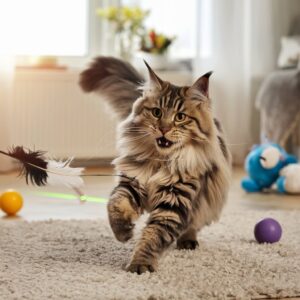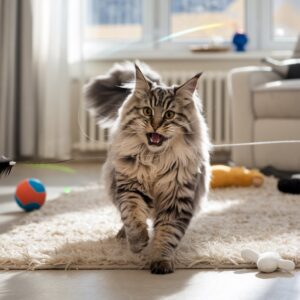A Complete Guide to Caring for Your Maine Coon Cat: Essential Tips and Insights
The Maine Coon cat is an extraordinary breed known for its impressive size and charming facial characteristics, making it a beloved choice among cat enthusiasts for generations. Hailing from the cold and stunning state of Maine, these cats are naturally adapted to thrive in frigid climates. Their thick, bushy tails resemble winter scarves, while their tufted ears contribute to their distinctive appearance. The luxurious fur coat of Maine Coons is available in an array of colors, further enhancing their appeal. However, it’s their robust physique, marked by large, muscular paws, that plays a vital role in their survival in harsh environments. They evoke the image of small lions, perfectly designed to flourish in snowy landscapes, serving not only as beautiful companions but also as resilient survivors of nature’s elements.
The personality of Maine Coons is nothing short of captivating, combining traits that draw people in effortlessly. Their sociable nature often resembles that of dogs, prompting many to affectionately describe them as having dog-like qualities. This observation is more than just casual; it reflects the genuine loyalty and affectionate disposition that sets them apart in the feline world. When a Maine Coon decides to bond with you, it truly feels like winning the lottery in the realm of pet companionship! Beyond their loving demeanor, these cats are also remarkably intelligent and playful. Watching a Maine Coon tackle a puzzle toy is akin to observing a chess match unfold, showcasing their strategic thinking and problem-solving abilities, which are delightful to witness.
Often lovingly dubbed as “gentle giants,” Maine Coons possess a calm and serene temperament that may lead one to underestimate their playful nature. They are inherently adventurous creatures, embodying the playful energy of children with a seemingly endless reservoir of enthusiasm. It’s not unusual to catch a glimpse of them gazing at you with their insightful, almost enigmatic eyes before they burst into a spontaneous fit of play, sending items tumbling as they frolic around the house like furry little wrecking balls. Their unique vocalizations, characterized by chirps and trills instead of standard meows, suggest that they are engaged in a constant dialogue, sharing their thoughts on everything from their latest meal to the day's weather.
With their combination of robust physical features, sharp intellect, and enchanting personalities, Maine Coons exemplify an exceptional breed. It’s no surprise that they hold a special place in the hearts of cat lovers. Each Maine Coon is like a rare gem, displaying its own unique personality and quirks, consistently surprising you just when you think you have them figured out.
Essential Tips for New Maine Coon Cat Owners
- Maine Coon cats are celebrated for their impressive size, friendly demeanor, and remarkable intelligence, making them perfect companions for families and individuals seeking a loving pet.
- To maintain the health and vitality of Maine Coon cats, a balanced diet rich in high-quality protein, along with proper hydration, is crucial.
- Regular grooming, including brushing and nail trimming, is essential to keep the Maine Coon's thick, water-repellent coat in optimal condition, preventing matting and shedding.
- As active and playful animals, Maine Coons require plenty of stimulating toys and opportunities for physical activity to support their overall well-being and happiness.
- Routine veterinary check-ups and vaccinations are vital for monitoring the health of Maine Coon cats, especially since they may be predisposed to certain genetic health conditions.
 Understanding the Nutritional Needs of Maine Coon Cats
Understanding the Nutritional Needs of Maine Coon Cats
Feeding a Maine Coon cat is a nuanced task that requires careful consideration of their specific nutritional needs, which can vary based on factors such as their size—being one of the largest domestic cat breeds—age, and activity levels. Maine Coons typically have higher energy expenditures compared to standard house cats, necessitating a more substantial food intake. However, it’s crucial to focus not only on the quantity but also on the quality of their diet. A well-balanced meal that prioritizes high-quality protein sources is vital for maintaining their muscle mass and overall health. This approach ensures that they receive the nutrients necessary for their unique physiology.
Many seasoned cat owners and veterinarians recommend diets that are rich in animal-based proteins, including chicken, turkey, and fish. These protein sources provide essential amino acids that not only fuel their energy needs but also support the maintenance of their substantial muscle structure. Additionally, it’s important to recognize the role of fats in their diet. Healthy fats contribute to the sheen and health of a Maine Coon's magnificent coat, ensuring it remains shiny and vibrant, much like the luxurious hair of a model after a professional conditioning treatment.
Hydration is another critical aspect of a Maine Coon's dietary needs. These cats are particularly susceptible to urinary tract issues, making it essential to ensure they have adequate water intake. Always provide your Maine Coon with easy access to fresh, clean water. Some cat owners find success in incorporating wet food into their cat's diet, as this not only adds moisture but also diversifies their meals, preventing boredom with repetitive kibble. Wet food serves as an exciting treat that keeps their palate engaged while also promoting proper hydration.
For those committed to optimizing their Maine Coon's health, consulting with a veterinarian to create a tailored feeding plan can be immensely beneficial. Veterinarians can offer personalized recommendations based on your cat's specific requirements, including age, weight, and any existing health concerns. Regularly monitoring their weight and adjusting their diet as they grow older or become more active is crucial in preventing obesity, which can be a common issue for these large felines if not managed properly.
Mastering Grooming and Coat Care for Maine Coon Cats
Maintaining the stunning coat of a Maine Coon cat involves dedicated grooming practices that ensure their fur remains in excellent condition while minimizing shedding and reducing the occurrence of hairballs, especially for those long-haired individuals. One effective strategy is to increase brushing frequency during shedding seasons, which typically occur in the spring and autumn. However, grooming extends beyond merely brushing their fur; it’s also vital to pay attention to their eyes, ears, and dental health.
Regularly cleaning their large ears with a veterinarian-recommended solution helps prevent the build-up of wax and debris, which can lead to more serious health issues if neglected. Additionally, keep an eye out for any unusual discharge from their eyes; signs of redness or excessive tearing may warrant further investigation from a veterinary professional. Maintaining excellent dental hygiene is equally important; incorporating regular tooth-brushing into your Maine Coon's routine, along with providing dental treats, can significantly reduce the risk of periodontal disease and ensure their overall health.
Engaging in regular grooming sessions not only supports your Maine Coon's health but also creates wonderful opportunities for bonding. It provides a chance to spend quality time together, enhancing your pet's comfort and overall well-being while fostering a deeper connection between you and your furry friend.
 Promoting Exercise and Playtime for Your Maine Coon Cat
Promoting Exercise and Playtime for Your Maine Coon Cat
Maine Coon cats thrive on regular exercise due to their energetic disposition and playful nature. Engaging in physical activity offers numerous benefits, including weight management and mental stimulation, which helps reduce the likelihood of behavioral issues stemming from boredom. Utilizing feather wands or laser pointers can effectively keep these playful felines entertained and physically active, ensuring they remain engaged and happy.
Given their natural curiosity and love for exploration, providing Maine Coons with climbing structures such as tall cat trees is essential. These additions to their environment not only satisfy their climbing instincts but also encourage active play. Establishing a routine for dedicated playtime each day can significantly enhance their happiness and overall well-being. Maine Coons particularly enjoy games that challenge their intellect, such as puzzle feeders or treat-dispensing toys that require them to think critically and solve problems, providing both mental and physical challenges.
Regular exercise not only aids in maintaining their physical shape but also strengthens the bond between you and your Maine Coon through shared activities. Observing their preferences during playtime can help you tailor activities to suit their interests; some may prefer chasing toys, while others might enjoy interactive games that involve their human companions. By creating an enriching environment filled with opportunities for play and exercise, you're not only contributing to your Maine Coon’s overall happiness but also stimulating their minds.
Ensuring Comprehensive Health Care and Routine Veterinary Visits for Maine Coon Cats
To secure the long-term health and vitality of your Maine Coon cat, it is imperative to prioritize preventative care and maintain regular veterinary appointments. Like all breeds, Maine Coons may be susceptible to certain hereditary conditions, including hypertrophic cardiomyopathy (HCM), hip dysplasia, and spinal muscular atrophy (SMA). Scheduling regular veterinary check-ups facilitates the early detection of potential health issues, allowing for timely intervention and management, which is crucial for their well-being.
In addition to routine examinations, preventative measures such as vaccinations, parasite control, and regular blood screenings are essential in maintaining your Maine Coon's health. Cat owners must also remain vigilant about their pet's behavior and health at home. Subtle changes in appetite, energy levels, or elimination habits may indicate underlying health concerns that require prompt attention.
Maintaining a healthy weight is particularly critical for this breed, as obesity can exacerbate existing health problems or lead to new ones. By fostering an open line of communication with your veterinarian and educating yourself about the specific health challenges faced by Maine Coons, you can take proactive steps to ensure your pet's health and longevity, allowing them to thrive for many years.
 Creating a Stimulating and Enriching Environment for Your Maine Coon Cat
Creating a Stimulating and Enriching Environment for Your Maine Coon Cat
To keep your Maine Coon cat happy and mentally stimulated, providing an enriched living environment is essential. These intelligent and curious felines flourish when offered ample opportunities for play, exploration, and interaction with their surroundings. Incorporating climbing shelves, engaging toys, and scratching posts can significantly minimize unwanted behaviors, such as chewing on furniture or excessive scratching, which are often the result of boredom.
Maine Coons are naturally curious and enjoy engaging with new toys and experiences. For those who can provide safe outdoor playtime, consider creating a “catio” or supervising outdoor excursions to protect them from potential hazards like traffic or other animals. Activities such as hiding treats around the house or setting up small obstacle courses can also be excellent ways to keep them engaged and cognitively stimulated, enhancing their quality of life.
By paying attention to the specific needs of Maine Coons, owners can cultivate a nurturing environment that promotes happy and healthy lives for their beloved pets, allowing them to thrive both mentally and physically.
Effective Training and Socialization Techniques for Maine Coon Cats
Training and socialization are crucial components for ensuring that your Maine Coon cat grows up to be a well-adjusted and happy companion. Despite their independent nature, these cats are highly trainable due to their intelligence and eagerness to please. Basic commands like “sit,” “stay,” and “come” can be effectively taught using positive reinforcement techniques, such as treats and verbal praise. This approach not only makes training enjoyable but also strengthens the bond between you and your cat.
Starting training early is beneficial, as it instills positive behaviors from a young age and enhances the human-animal bond. Consistency is key; shorter, more frequent training sessions tend to be more effective than longer, infrequent ones. Equally important, especially during the initial months of a Maine Coon’s life, is socialization. Exposing them to a variety of people, animals, and environments early on fosters confidence and adaptability.
Gradually introducing them to new experiences, such as meeting other pets or visiting new locations, can help prevent the development of anxiety or fear as they mature. By emphasizing training and socialization from a young age, owners can cultivate Maine Coons that are not only loving companions but also fearless explorers, ready to navigate the world with confidence.
Common Questions and Answers About Maine Coon Cats
What is the typical lifespan of a Maine Coon cat?
The typical lifespan of a Maine Coon cat ranges from 12 to 15 years, although some individuals may live well into their late teens with proper care and a healthy lifestyle, making them cherished companions for many years.
What grooming requirements do Maine Coon cats have?
Maine Coon cats have a thick, water-repellent coat that necessitates regular grooming. It’s recommended to brush them at least a few times a week to prevent matting and reduce shedding, ensuring their coat remains healthy and manageable, which is crucial for their overall well-being.
Are Maine Coon cats susceptible to specific health issues?
While Maine Coon cats are generally healthy, they can be prone to certain genetic health concerns, including hip dysplasia, hypertrophic cardiomyopathy, and spinal muscular atrophy. Regular veterinary care is essential for monitoring their health and addressing any potential issues early.
What type of diet is ideal for Maine Coon cats?
Feeding Maine Coon cats a high-quality, balanced diet that is tailored to their age, activity level, and any health issues is crucial. Monitoring their weight and adjusting their diet as necessary can help prevent obesity and promote a healthy lifestyle.
How much physical activity do Maine Coon cats require?
Maine Coon cats are an active and playful breed, benefiting from regular playtime and interactive toys to keep them mentally and physically engaged. Providing climbing structures or cat trees is also beneficial for their natural instinct to explore and climb, enhancing their overall happiness.
The article: Caring for Maine Coon Cats the Right Way appeared first on Unity Pets.
The Article Maine Coon Cats: The Right Way to Care for Them Was Found On https://limitsofstrategy.com


Comments are closed